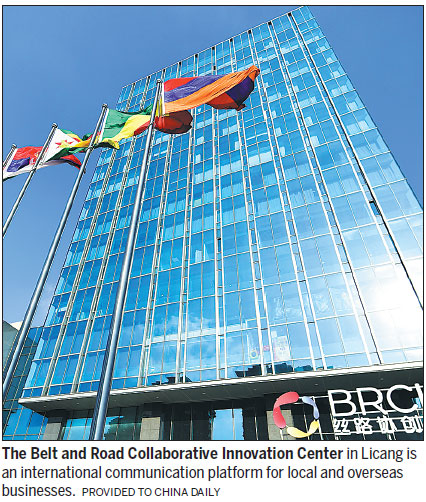Licang fosters modern economic drivers

Licang district in Qingdao is fostering new economic engines by setting up high-tech industrial parks, as part of its efforts to become a hub city not only in Shandong province but also in East China.
"Developing new economic drivers will lead to high-quality growth in Licang, as well as the whole of Qingdao," said Wang Xijing, Party chief of the district.
Qingdao International Academician Park is an important venue for nurturing new growth drivers in Licang, he added.
Since its establishment less than two years ago, the park has cooperated with a number of renowned scientists from home and abroad, such as Chinese agronomist Yuan Longping and Canadian biologist Yutian Wang, to name just a few.
Yuan Longping, who is called the "father of hybrid rice" in China, initiated a saline-resistant rice research and development project in Licang, which aims to improve rice farming in saline-alkali soil. The rice yield on his experimental farm is predicted to reach a new industry peak.
Yuan plans to use the results of the research conducted in Licang to improve more than 6 million hectares of saline-alkali land around the world. The project is expected to create an industry worth 1 trillion yuan ($158 billion), focused on farming on improved soil.
Another important project based in Licang is the National New Functional Materials Research Center headed by academician Hou Li'an, which focuses on the industrialization of air and water purification materials and environmental cleaning equipment. It will go into operation this April. The park will establish more than 30 projects this year, forging an industrial cluster worth 10 billion yuan.
"The number of projects settling in Qingdao International Academician Park has hit 12 to date," Wang said.
"We should always give priority to commercializing research results and use such achievements to transform and upgrade local enterprises."
Also based in the district, the Belt and Road Collaborative Innovation Center is an international communication platform established in the context of the Belt and Road Initiative.
The center started off by attracting businesses from countries involved in the Belt and Road Initiative to set up contact offices. Today, it is an important venue for innovative cooperation between Qingdao and overseas companies.
The center has forged links with 62 countries and regions and has signed cooperation agreements with 28 countries and regions. Businesses and organizations from 12 countries have established economic and trade centers there.
The projects the center is currently promoting include a visa service center, a commodity trading agency, a tourism company, a bonded warehouse and an overseas special economic zone.
In the next three to five years, the center will help businesses to establish 100 branches and 100 collaborative innovation bases in domestic and international cities.
Global e-commerce giant Amazon has established its Qingdao-Amazon Web Services Joint Center in Licang. Relying on Amazon's public cloud service resources, the project aims to boost the incubation of internet-related businesses.
More than 80 enterprises have already settled in the 30,000-square-meter pioneer zone at the Amazon center.
The businesses cover diverse sectors, such as big data, intelligent manufacturing and software development. They paid total combined tax revenue of 10 million yuan in 2017.
zhangdandan@chinadaily.com.cn

(China Daily 03/08/2018 page12)
MOST POPULAR
- 1 China to give visa-free treatment to another 9 countries
- 2 China fully opens manufacturing sector to foreign investors in landmark opening up move
- 3 China's import expo attracts record-breaking participating countries, exhibitors
- 4 China's door opening even wider to foreign visitors, businesses
- 5 China revises rules to ease foreign strategic investment in listed firms
Editors' Picks
 Video:
Peru sees new port open
Video:
Peru sees new port open
 Infographic:
China's public holidays for 2025
Infographic:
China's public holidays for 2025
 Infographic:
Basic facts of APEC
Infographic:
Basic facts of APEC
 Infographic:
Wrapping up the 7th CIIE: Data recap
Infographic:
Wrapping up the 7th CIIE: Data recap



